Health Equity Matters Newsletter
News You Can Use!
New HHS Widget Provides Health Disparity Data
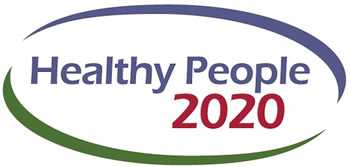
The U.S. Department of Health & Human Services (HHS) Office of Disease Prevention and Health Promotion and the HHS Office of Minority Health are pleased to announce the release of a new health disparities data widget. The widget provides an easy way to find health disparities data related to the Healthy People 2020 objectives for the Leading Health Indicators (LHIs). LHIs are critical health issues that when addressed will help reduce the leading causes of death and preventable illnesses.
The widget provides charts and graphs of disparities data at your fingertips. Use the widget to browse data by:
- Disparity type—including disability, education, income, location, race and ethnicity, and sex
- Leading Health Indicator
It’s easy to embed the widget on your own website to give your networks easy access to the latest available disparities data. Once you’ve added the widget, there’s no technical maintenance required. The content will update automatically. For more information about how to add the widget to your website, visit Health Disparities Widget.
Your Comments Matter–Healthy People 2030 Proposed Framework Partner Toolkit
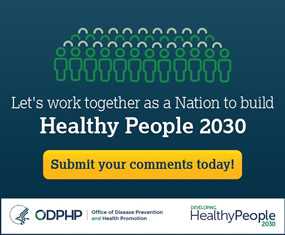
The U.S. Department of Health and Human Services (HHS) is soliciting written comments on the proposed framework for Healthy People 2030 that was developed by the Secretary’s Advisory Committee on National Health Promotion and Disease Prevention Objectives for 2030 (Committee).
This framework includes the Healthy People 2030 vision, mission, foundational principles, plan of action, and overarching goals — and it will guide the selection and prioritization of objectives for Healthy People 2030.
Members of the public are invited to submit comments on the proposed framework from June 27 through September 29, 2017. Learn more and submit your comments today!
NIMHD Grantee Launches Conversations on Health Equity Video Series
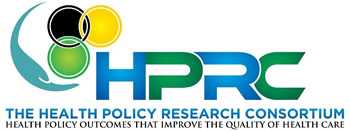
The Health Policy Research Consortium (HPRC) has launched its new public policy video series entiled Conversations on Health Equity. The 3-part series features interviews with National Institute on Minority Health and Health Disparities (NIMHD) Director, Dr. Eliseo Pérez-Stable, with eight health equity leaders. It explores major policy issues in the public debate over how to best address health inequities in the mid-Atlantic region and nationally. Some of the topics include heart disease, diabetes, cancer, opioid addiction, and maternal and child health. The Health Policy Research Consortium is a NIMHD grantee. You can view Conversations on Health Equity on YouTube.
CDC Chronicles National Public Health Improvement Initiative Program Impact
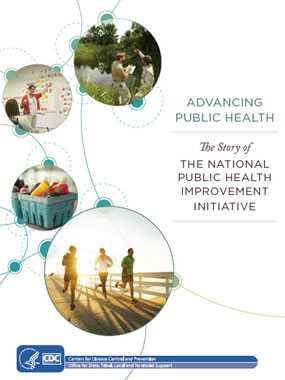
The Centers for Disease Control and Prevention (CDC) implemented the National Public Health Improvement Initiative (NPHII) with a goal of improving public health. From 2010 to 2014, NPHII provided $142 million and technical assistance to 73 awardees including: 48 states and the District of Columbia, nine cities or counties serving large populations, four U.S. territories, three U.S.-affiliated Pacific Islands and one Pacific Island organization, four federally recognized tribes and four tribal organizations that support approximately 250 federally recognized tribes. Awardees were empowered to increase public health accreditation readiness, improve efficiency and effectiveness through quality improvement initiatives, and increasing performance management capacity.
Through the NPHII, agencies increased their ability to make data-driven decisions for priority setting, program planning, and implementation, eliminated siloes through partnerships and collaborations, strengthened the culture for performance improvement, and institutionalized these practices within the agency. Now that NPHII activities are complete, the successes and outcomes of the program have been published in Advancing Public Health: The Story of the National Public Health Improvement Initiative, a compendium that describes the initiative’s history and goals. The compendium also contains 71 individual stories about the activities of each funded health department.
If you’d like to explore other work to advance public health system performance, capacity, and agility, consider subscribing to the general OSTLTS email list to receive important CDC information of interest to state, tribal, local, and territorial public health professionals.
New Handbook Helps Clinicians Communicate Health Information with Older Adults
Older adults may need specialized medical services and health information. Health care professionals should be able to communicate valuable health information that older adults can understand and benefit from. The National Institute on Aging at NIH published Talking With Your Older Patient, A Clinician’s Handbook. This handbook offers guidance for communicating with older adults in a way that promotes respect, understanding, and treatment adherence. Get this resource and more information by visiting the “Older Adults” section of the CDC Health Literacy website. Also, check out CDC’s Clear Communication Index, a research-based tool that helps you develop and assess communication materials for your intended audience.
Preventing Cognitive Decline and Dementia: A Way Forward
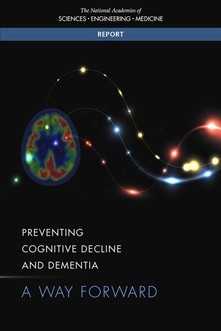
Understanding of the pathological processes that result in dementia and cognitive impairment has significantly advanced through the years. A number of clinical trials of potential preventive interventions have been completed and published, with more under way or being planned. A systematic review published in 2010 by the Agency for Healthcare Research and Quality (AHRQ) and an associated “state of the science” conference at the National Institutes of Health (NIH) concluded that there was insufficient evidence to make recommendations about interventions to prevent cognitive decline and dementia. Within that context, the National Institute on Aging (NIA) initiated a study with the National Academies of Sciences, Engineering, and Medicine to review the current state of knowledge on interventions for preventing cognitive decline and dementia. Those recommendations are compiled in Preventing Cognitive Decline and Dementia: A Way Forward. The report provides a primary evidence base for recommendations on the appropriate content for communicating with the public about steps that can be taken to prevent, slow, or delay the onset of mild cognitive impairment (MCI) and clinical Alzheimer’s-type dementia (CATD) and delay or slow age-related cognitive decline (ARCD), as well as recommendations for future prevention research. You can access the full visit the Preventing Cognitive Decline and Dementia: A Way Forward report highlights on the National Academies of Science Engineering Medicine website.Preventing Cognitive Decline and Dementia: A Way Forward
- Page last reviewed: August 29, 2017
- Page last updated: August 29, 2017
- Content source:


 ShareCompartir
ShareCompartir